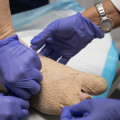As technology and scientific advancements continue to progress, the field of medicine is constantly evolving. California, known for its innovative spirit and forward-thinking mindset, is at the forefront of this evolution. With a booming tech industry and top-notch research institutions, it's no surprise that some of the most groundbreaking medical innovations are coming out of California. From personalized medicine to telemedicine, there are numerous breakthroughs on the horizon that will transform how healthcare is delivered in California. These innovations have the potential to revolutionize patient care, improve outcomes, and even save lives.
Artificial Intelligence In Medicine
In the quest for better healthcare, California's medical industry has been exploring new frontiers in technology. One of the most promising areas is Artificial Intelligence (AI). As machine learning applications continue to evolve, they are proving increasingly useful in diagnosing and treating a wide range of diseases. One key advantage of AI is its ability to analyze vast amounts of data quickly and accurately. This can help doctors make more informed decisions about patient care, leading to improved outcomes.
However, as with any new technology, there are also ethical considerations that need to be taken into account. For example, how do we ensure that patients' privacy rights are respected when their health information is being analyzed by algorithms? These questions will need careful consideration as AI continues to play an increasingly important role in medicine.
Precision Medicine And Personalized Treatments
These are quickly becoming the norm in California's medical industry. With genetic testing advancements, doctors can now analyze a patient's DNA to better understand their unique genetic makeup and identify potential health risks before they become major problems. In addition, this information allows for individualized drug therapies that target specific genes or proteins responsible for the disease. Medicated drugs sometimes cause controversial and legal issues.
Some medical laboratories are even accused of drug-related crimes, which is why it is crucial for medical laboratories and healthcare providers to adhere to strict ethical and legal standards when conducting genetic testing and providing personalized drug therapies. In the event of any allegations of drug-related crimes or controversies in medical laboratories, it is essential to have an Orange County criminal defense law firm, to ensure proper legal representation and protection of rights.
One of the most exciting developments in personalized medicine is the use of immunotherapy treatments tailored toward an individual's own immune system. These treatments have been incredibly successful in treating certain types of cancer, and with continued research, it is likely that they will become more widely available to patients. As technology continues to advance, we can expect even more breakthroughs in Precision Medicine and Personalized Treatments that will transform how we approach healthcare. As the field of personalized medicine continues to grow, it is important that both patients and healthcare professionals stay up-to-date on new advancements.
By utilizing these cutting-edge technologies such as genetic testing and customized drug therapies, physicians are able to provide targeted care that leads to improved outcomes for their patients. The future of medicine in California looks promising thanks to these innovative approaches which seek to treat each patient as an individual rather than just another number in a chart.
Gene Editing And CRISPR Technology
Precision medicine and personalized treatments have paved the way for a more patient-centric approach to healthcare. But as we delve deeper into the realm of medical innovation, another breakthrough technology is emerging: gene editing through CRISPR. Just like precision medicine, CRISPR also promises a future in which diseases can be treated with unparalleled accuracy. Imagine that our genetic code is like a book - each page representing a different trait or characteristic. With CRISPR, scientists are now able to edit specific pages or even chapters within this book, potentially curing genetic disorders and preventing hereditary illnesses from being passed down to future generations.
However, as with any new technology, there are ethical implications that must be considered alongside its promising potential applications. The future of gene editing raises important questions about how far we should go in manipulating human DNA and whether it could lead to unintended consequences. Additionally, concerns over accessibility arise as these technologies may only be available to those who can afford them.
While the possibilities presented by gene editing are exciting, it's important that we proceed with caution and consideration toward both the science and ethics involved. As research continues in this field, we will undoubtedly uncover new ways to harness the power of genetics for good while navigating the complex terrain of moral responsibility.
Telemedicine And Remote Patient Care
These are rapidly evolving in California, with the proliferation of virtual consultations and home healthcare services. These innovative approaches to healthcare delivery have gained popularity due to their convenience and cost-effectiveness.
Patients can now receive medical attention from the comfort of their homes, without having to physically visit a doctor's office or hospital. Virtual consultations have become increasingly common as telemedicine gains traction. With this approach, patients can consult with doctors via video conferencing, eliminating the need for travel time and expenses.
Additionally, home healthcare services allow for treatment at home instead of hospitals or clinics. This is especially beneficial for elderly individuals who require frequent check-ups but may not be able to travel long distances. The future of medicine in California will undoubtedly see an increase in these types of innovations as more people realize their benefits.
Wearable Technology And Patient Monitoring
As telemedicine and remote patient care becomes more prevalent in California, wearable technology is also making its mark on the future of medicine. Real-time tracking devices are becoming increasingly popular among patients who want to monitor their health status continuously. These wearables can track vital signs such as heart rate, blood pressure, and oxygen levels, giving doctors a comprehensive view of their patient's overall health.
Moreover, wearable technology has opened up new possibilities for remote diagnosis. Patients can use these devices to collect data and transmit it directly to their healthcare providers, allowing for quick and accurate diagnoses without needing in-person visits.
The ability to diagnose remotely not only saves time but also provides greater access to medical care for those living in rural or underserved areas. As wearable technology continues to evolve, we can expect even more breakthroughs that will change the way we approach patient monitoring and treatment in the years ahead.
Collaborations And Partnerships In Medical Research And Development In California
Collaborations and partnerships between academic institutions and private companies play a crucial role in the advancement of medical research, innovation, and patient care. The medical field is a complex and rapidly evolving domain, requiring diverse expertise and resources to tackle the challenges it presents. By joining forces, academic institutions, and private companies can leverage their respective strengths and create synergistic relationships that benefit all stakeholders involved.
One notable example of such a collaboration is the partnership between academic medical institutions and legal firms specializing in criminal defense, such as The Law Office of Jacqueline Goodman. While it may seem unusual to associate a legal firm with medical facilities, their collaboration can be valuable when medical facilities face criminal accusations or legal challenges. Meanwhile, academic institutions provide a wealth of scientific expertise, clinical trial capabilities, and patient populations necessary for advancing new treatments and therapies. Through these collaborations, California is poised to make significant strides in solving some of the most pressing healthcare issues facing our society today.






